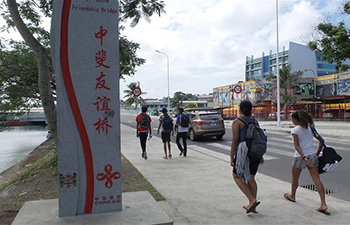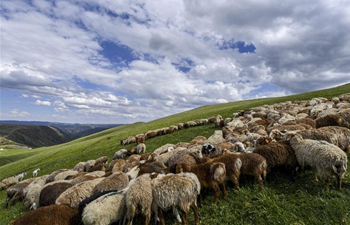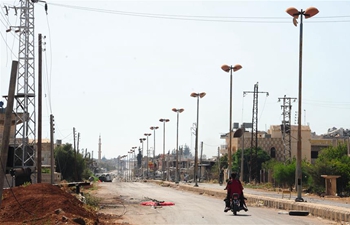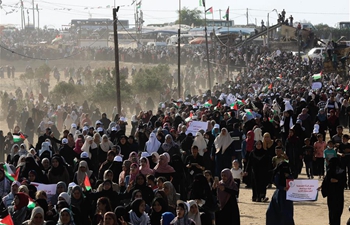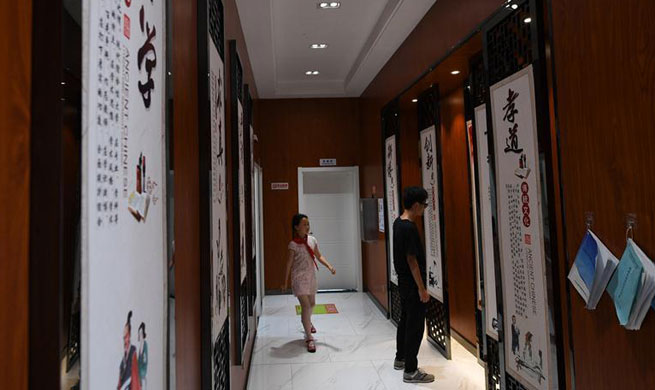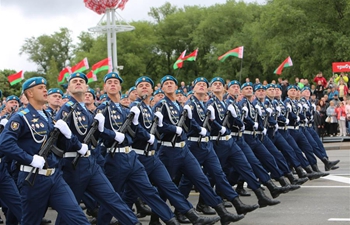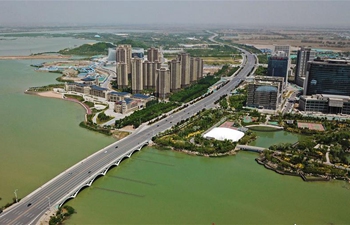URUMQI, July 4 (Xinhua) -- China's Xinjiang Uygur Autonomous Region has made great progress in the fight against poverty over the past few years, with the development of industries covering a wide range of fields being a contributing factor.
Local resident Memtimin Ehet used to search for temporary jobs to support his family. The crops he grew on his 0.2 hectares of land were far from enough to feed his family of four.
Fortunately, the 37-year-old was recruited by a local winery set up by a Shanghai wine company in February and this new opportunity brought him a steady income.
After three-months of training, Memtimin Ehet officially became a worker, and his diligent as well as excellent grape planting skills earned him a promotion to team leader after just two months.
"I earn 3,300 yuan (495 U.S. dollars) every month and I'm very happy with the salary," he said.
Memtimin Ehet was one of the over 100 local residents employed by the Shanghai company, while more Xinjiang residents are expecting to be lifted out of poverty since thousands of enterprises across the country have participated in the battle against poverty in the region. They have brought numerous job opportunities and simultaneously increased poor residents' income.
Statistics showed that 16 Chinese centrally administered state-owned enterprises have carried out targeted poverty alleviation in 27 poverty-stricken counties in Xinjiang, investing nearly 100 million yuan (15 million U.S. dollars) to help more than 10,000 poor residents in 2017.
During the same period, more than 1,600 private enterprises have also joined the campaign and invested more than 6 million yuan into diverse anti-poverty projects, benefitting 170,000 poor people from 830 villages.
The regional poverty alleviation and development office said, in 2017, 19 provinces and cities invested around 7.5 billion yuan and launched 545 poverty relief projects in Xinjiang, including improving impoverished people's housing conditions, developing education, and improving healthcare and sanitation quality.
A total of 317,400 people and 331 villages were lifted out of poverty in 2017, and the poverty headcount ratio dropped from 15.5 percent in 2016 to 12.6 percent last year, according to the office.
However, government data shows there are still 1.62 million impoverished people living in the region. They are scheduled to be lifted out of poverty by 2020.
In addition, since 2016, more than 1 million cadres from governments of different levels in Xinjiang and of other provinces have been encouraged to strengthen their relations with local people, to visit them regularly and find out what they really need.
Zhou Bangyu, an official from Hunan Province in central China, helped Yiburanyim Abulza, a poor villager in Toksun County sell 800 kilograms of dried grapes in two weeks.
"I used to sell dried grapes by the roadside. It used to take four months to sell such a large amount of dried grapes. Thanks to my friend Zhou, the dried grapes sold out online in just a few days," said Yiburanyim Abulza.
Meanwhile, Xinjiang has stepped up efforts to develop its tourism and textile industries to boost local employment and increase income in recent years.
More than 100 million people visited Xinjiang last year, with tourists spending around 182 billion yuan, up 30 percent from 2016.
As the largest cotton grower in China, Xinjiang has attracted many famous textile companies from east and south China to set up branches in the region.
As of 2017, there are more than 2,700 registered textile companies in Xinjiang, which have provided jobs for more than 350,000 local residents.
The battle against poverty is one of the "three tough battles" that the country must win to build a moderately prosperous society by 2020. To achieve its goal, China needs to lift around 30 million residents out of poverty in the next three years.
The National Development and Reform Commission said a total of 3.84 billion yuan is earmarked for reducing poverty this year, with 90 percent going to Xinjiang, Tibet, Qinghai, Sichuan, Yunnan and Gansu.




